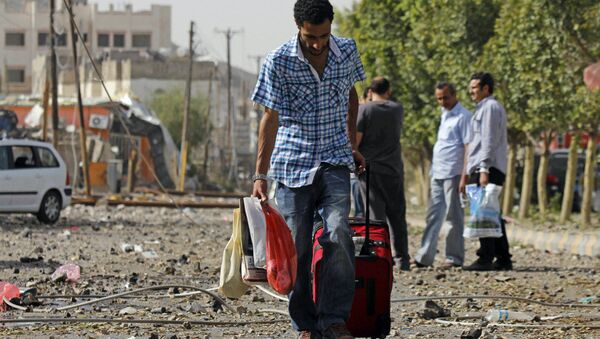"We hope that everybody will return to dialogue to solve and treat all the issues," Saleh said on his Twitter account. However, the civil war in the Middle East's poorest nation has its roots way back in the early 1990s and any hope of a peaceful solution may prove premature.
So far 8,344 people have fled #Yemen to #Djibouti.Abt 5,100 are Third Country Nationals representing 60% of the total pic.twitter.com/F5i9KJNL0U
— IOM (@IOM_news) April 22, 2015
According to Tobias Thiel, a PhD student at the London School of Economics' Department of International History, the domestic power struggle owes its origins to the negotiated resignation of Saleh in 2011. He says in his Middle East Centre blog:
"The poorest country on the Arabian Peninsula is now headed for a humanitarian catastrophe of devastating proportions. The landscape of stakeholders on the ground is messy and politically pragmatic."
Militiamen in southern Yemen said they would continue fighting Iran-allied Houthi rebels until they drove them out of the region, despite Saudi Arabia saying it would end air strikes against the insurgents.
WHO warns of imminent collapse of health care services in #Yemen http://t.co/kjiUVBnYuE pic.twitter.com/6ZDotvf2sH
— WHO (@WHO) April 21, 2015
Teheran and Riyadh Backing
The crisis is part of a regional power struggle between Shia-ruled Iran and Sunni-ruled Saudi Arabia.
Arab Gulf states accuse Iran of backing the Houthis — which they deny, while also backing Abd Rabbuh Mansur Hadi.
Yemen. Nothing ever finished all the way. Revolutions, wars, treaties, dialogues.1962, 1990, Sadah wars, 2011, NDC, GCC initiative, etc
— Ammar Al-Aulaqi (@ammar82) April 22, 2015
Thiel says the Houthis are a religio-political movement that emerged in the early 1990s against the victimisation of the Zaydi Muslims who make up around 35 percent of the population and are fighting alongside military units loyal to ex-President Saleh.
"This marriage of convenience remains fragile, however, as Saleh, with whom the movement engaged in six brutal wars between 2004 and 2010, might withdraw his support due to political opportunism. Despite his meagre domestic support base, their adversary, President Abd Rabbuh Mansur Hadi, has garnered a loose anti-Houthi coalition that includes such diverse forces as the Sunni Islamist Islah party and the southern secessionist movement, Hirak al-Janubi," Thiel says.
However, the politics are further blighted by the fact that the Houthis and al-Qaida in the Arabian Peninsula (AQAP) are fighting against each other. Thiel says that although the war is often described as a proxy war between Saudi Arabia and Iran, the power struggle between Hadi and the Huthis has little to do with sectarianism.
Saudi-led airstrikes continue to pound #Sanaa http://t.co/YVux60JEiK #Yemen
— Ruptly (@Ruptly) April 21, 2015
Instead, Thiel argues the current dispute can be linked back to the failure of the Gulf Cooperation Council (GCC) in 2011 which promised a negotiated transition process with the promise of fundamental reforms. Although the GCC Initiative ensured an orderly power transfer to Saleh's long-time deputy Hadi in early 2012 it failed to institute a genuinely inclusive power-sharing arrangement.
When the Houthis took over major swaths of Yemen and forced Hadi to flee the capital Sanaa in February, he fled to Saudi Arabia and issued a plea for an Arab military intervention at an Arab League summit in Egypt on 28 March.
Thiel says: "Although the aerial campaign pulverised the Houthi-controlled Yemeni air force, missile launching sites and air defences within hours, it failed to halt the movement's southward advance to Aden, the last major city in Hadi's sphere of influence.
"The Saudi-led military intervention regionalised Yemen's domestic conflict. It is motivated by a deep paranoia about what the conservative monarchy sees as an Iranian proxy militia, and thus primarily intended as a message to Tehran."


